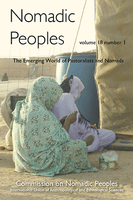
NOMADIC PEOPLES
Scope & Guideline
Fostering Dialogue on Mobility and Social Structures
Introduction
Aims and Scopes
- Pastoralism and Mobility Studies:
The journal focuses on the dynamics of pastoralism, emphasizing the mobility patterns of pastoralist communities and their interactions with the environment and state policies. - Cultural and Political Aspects of Nomadism:
Research in this journal highlights the cultural expressions, political struggles, and identity formations among nomadic peoples, showcasing their unique perspectives and narratives. - Environmental Sustainability and Land Management:
The journal emphasizes sustainable land use practices and the role of traditional ecological knowledge in managing rangelands, addressing contemporary challenges such as climate change and resource management. - Interdisciplinary Approaches:
It encourages interdisciplinary research that integrates anthropology, sociology, environmental science, and policy analysis to provide comprehensive insights into the lives of nomadic peoples. - Impact of Globalization and Development:
The journal examines how global economic trends and development agendas affect pastoralist communities, including issues related to land rights, resource access, and socio-economic transitions.
Trending and Emerging
- Climate Change and Resilience:
Recent articles have increasingly addressed the impact of climate change on pastoralist livelihoods, focusing on resilience strategies and adaptation measures in response to environmental challenges. - Policy Analysis and Advocacy:
There is a growing emphasis on examining policies that affect nomadic communities, including land rights, social cohesion, and development interventions, highlighting the need for advocacy and informed policy-making. - Gender Perspectives in Pastoralism:
Emerging research is increasingly exploring gender roles and perceptions within pastoralist communities, revealing how gender dynamics influence resource management and social structures. - Technological Integration and Innovation:
The integration of technology in pastoralist practices, including livestock management and market access, has become a significant theme, reflecting the adaptation of nomadic communities to modern challenges. - Interconnectedness of Local and Global Issues:
There is a trend towards exploring the interconnectedness of local pastoralist practices with global economic and environmental issues, emphasizing the need for holistic approaches to understanding nomadic life.
Declining or Waning
- Traditional Practices and Heritage:
There is a noticeable decrease in publications focusing solely on traditional practices and cultural heritage of nomadic communities, possibly overshadowed by more pressing issues such as climate change and economic challenges. - Historical Studies of Nomadism:
Research dedicated to historical perspectives on nomadic societies has become less frequent, as contemporary issues take precedence, reflecting a possible shift towards present-day challenges and solutions. - Static Representations of Nomadism:
The journal has moved away from static, romanticized representations of nomadic life, with fewer articles focusing on idealized views of pastoralist lifestyles, which may be seen as outdated. - Single-Narrative Approaches:
There is a decline in studies that present a singular narrative of nomadic experiences, as the journal increasingly values diverse and multifaceted perspectives.
Similar Journals
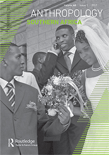
Anthropology Southern Africa
Championing high-quality research in anthropology and beyond.Anthropology Southern Africa is a prestigious journal published by Routledge Journals, Taylor & Francis Ltd, and is dedicated to advancing the field of anthropology through rigorous scholarship and critical discourse. Established in 2013 and converging through 2024, this journal sets a high standard in its category, currently holding a Q2 classification in Anthropology and a Q1 ranking in Cultural Studies for the year 2023, ensuring its position as a significant contributor to social science research. With a robust Scopus ranking that places it in the 82nd percentile for Cultural Studies and the 67th percentile for Anthropology, Anthropology Southern Africa serves as an essential platform for researchers, professionals, and students engaged in anthropological inquiry and cultural analysis. Although it is not openly accessible, the publication prides itself on high-quality submissions that explore diverse cultural phenomena and anthropological perspectives, thereby inviting interdisciplinary engagement and fostering a global academic dialogue.

Inner Asia
Transforming Perspectives on Inner AsiaInner Asia, a distinguished journal published by BRILL, serves as a vital platform for scholarly discourse in the interdisciplinary fields of Anthropology, Arts and Humanities, Development, and Geography, Planning and Development. Since its inception in 1999, this peer-reviewed journal has facilitated in-depth research and analysis of the diverse cultures, histories, and socio-economic issues pertaining to Inner Asia, contributing significantly to the comprehension of this often-overlooked region. Although it currently operates without open access, the journal is committed to rigorous academic standards, as evidenced by its recent rankings—placing within the Q3 and Q4 categories across multiple relevant disciplines, denoting its solid reputation among global academic circles. Researchers, professionals, and students alike rely on its comprehensive studies to inform their work and expand their understanding of the complexities of Inner Asia, ultimately fostering greater interdisciplinary dialogue and collaboration.

JOURNAL OF MODERN AFRICAN STUDIES
Shaping Discourse on Africa's Modern ChallengesJOURNAL OF MODERN AFRICAN STUDIES, published by CAMBRIDGE UNIV PRESS, is a premier academic journal that has been a cornerstone for interdisciplinary research on contemporary issues facing Africa since its inception in 1963. With an ISSN of 0022-278X and an E-ISSN of 1469-7777, this journal plays a critical role in shaping the discourse around African studies, encompassing vital topics in Geography, Planning and Development and Sociology and Political Science. The journal holds a commendable Q2 quartile ranking in both fields, indicating its solid reputation and influence, with Scopus ranks reflecting its academic impact within the top echelons of social sciences. The journal’s commitment to quality scholarship aims to foster a deeper understanding of socio-political dynamics, cultural transformations, and economic developments across the continent. While it does not offer open access, its rigorous peer-review process ensures that contributions are impactful and relevant to researchers, professionals, and students alike. The JOURNAL OF MODERN AFRICAN STUDIES continues to be essential reading for anyone engaged in the ever-evolving narratives of modern Africa.
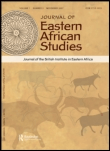
Journal of Eastern African Studies
Exploring the Rich Tapestry of Eastern AfricaJournal of Eastern African Studies, an esteemed publication within the field of anthropology, cultural studies, history, and political science, is published by Routledge Journals, Taylor & Francis Ltd from its base in the United Kingdom. With an impressive impact factor reflected by its Q1 ranking in multiple categories—including anthropology, cultural studies, and history—this journal stands as a critical resource for scholars and professionals interested in understanding the complexities of Eastern Africa. Since its inception in 2009, the journal has explored diverse themes pertinent to the region's socio-political landscape, indigenous cultures, and historical trajectories, while contributing significantly to ongoing academic discourse. Although currently not an open-access journal, its commitment to high-quality scholarship and its accessibility through major academic databases underscore its importance in advancing research and fostering deeper insights into Eastern African Studies. The journal's rigorous peer-review process ensures that only the most relevant and impactful research is disseminated, solidifying its position as a leading outlet in the field.

Agricultural and Resource Economics-International Scientific E-Journal
Exploring sustainable solutions for a changing world.Agricultural and Resource Economics-International Scientific E-Journal is a leading open-access publication dedicated to advancing the fields of agricultural and resource economics. Published by the esteemed INST EASTERN EUROPEAN RESEARCH & CONSULTING since 2015, this journal provides a vital platform for innovative research and discourse, particularly within the context of Eastern Europe. With an impressive Q2 ranking in Agricultural and Biological Sciences and Q3 rankings in both Business, Management and Accounting and Marketing, it serves as a key resource for academics and practitioners alike, fostering collaboration and knowledge exchange. The journal's commitment to accessibility and inclusivity is evident through its open-access policy, allowing researchers from around the globe to share and benefit from cutting-edge findings. Set against the backdrop of a rapidly evolving agricultural landscape, this journal plays a crucial role in exploring the intersection of economics, sustainability, and resource management, making it an essential read for anyone invested in the future of these critical fields.
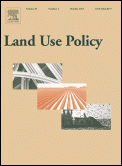
LAND USE POLICY
Pioneering Research in Land Management and PolicyLAND USE POLICY, published by ELSEVIER SCI LTD, is a premier academic journal dedicated to advancing the study of land use issues and policies, with a particular focus on sustainable management and conservation practices. Since its inception in 1984, this journal has established itself as an influential platform in the fields of Forestry, Geography, Planning and Development, and Environmental Science, consistently achieving a Q1 category ranking across various disciplines. With an impressive impact factor and recognition as a top-tier source (e.g., ranking #18/821 in Geography and Planning), it serves as a critical resource for researchers, practitioners, and policy-makers looking to address complex land use challenges. Although it does not offer open access, the journal's articles are widely accessible through institutional subscriptions, enhancing its reach. Researchers and students can find valuable insights into innovative policies and methodologies that promote sustainable land management, making LAND USE POLICY essential reading for anyone engaged in environmental studies and policy development.

Novos Cadernos NAEA
Promoting accessible knowledge for a better tomorrow.Novos Cadernos NAEA is a prominent open-access journal published by Universidade Federal do Pará, dedicated to advancing the field of applied social sciences and environmental studies. Since its inception in 1998, this journal has established itself as a vital platform for researchers and practitioners to disseminate innovative research, engage in scholarly conversations, and promote interdisciplinary approaches to contemporary issues affecting society and the environment. With an ISSN of 1516-6481 and an E-ISSN of 2179-7536, it aims to enhance accessibility to knowledge by ensuring that all articles are freely available online, thereby supporting the global academic community. The journal's commitment to quality research is evident, making it an essential resource for scholars, students, and policymakers looking for cutting-edge analysis and insights in their fields.
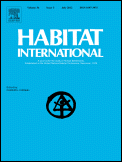
HABITAT INTERNATIONAL
Uncovering critical issues in habitat and urban planning.HABITAT INTERNATIONAL is a prestigious academic journal published by Pergamon-Elsevier Science Ltd, based in the United Kingdom. With an impressive Q1 ranking in both Nature and Landscape Conservation and Urban Studies, this journal has established itself as a leading platform for the dissemination of high-quality research in the fields of environmental sustainability, human-environment interactions, and urban planning. Having commenced in 1970, it has evolved through several converged periods, demonstrating its long-standing commitment to fostering scholarly discourse and innovation. Researchers and professionals in urban studies, conservation, and related domains will find value in the journal's rigorous peer-reviewed articles, which address critical issues facing habitats and urban environments today. While the journal does not currently offer open access options, its impact factor and SCOPUS rank - Rank #10/279 and 96th percentile in Urban Studies - underline its importance in advancing knowledge and understanding in these dynamic fields.
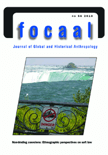
Focaal-Journal of Global and Historical Anthropology
Bridging Historical Contexts with Contemporary IssuesFocaal-Journal of Global and Historical Anthropology is an esteemed academic journal published by BERGHAHN JOURNALS, focusing on the intricacies of global and historical anthropology. With an impressive impact factor and positioned in the Q1 category of anthropology for 2023, this journal is recognized for its exceptional contributions to the field, ranking #121 out of 502 in the Social Sciences category on Scopus. Since its transition to Open Access in 2020, Focaal has made significant strides in democratizing academic knowledge, allowing broader accessibility for researchers, professionals, and students worldwide. The journal provides a platform for interdisciplinary dialogue and critical analysis, paving the way for innovative research and thought-provoking discussions. With a commitment to fostering a deeper understanding of anthropological practices and their global implications, Focaal is an essential resource for anyone engaged in contemporary anthropological studies.
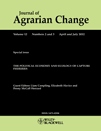
Journal of Agrarian Change
Charting New Territories in Agrarian ResearchJournal of Agrarian Change is a premier academic journal published by WILEY, dedicated to advancing the understanding of agrarian studies within the fields of anthropology, archaeology, and environmental science. With an impressive convergence of scholarly contributions since its inception in 2001 and extending through 2024, the journal proudly holds a Q1 ranking in Anthropology and Archaeology, reflecting its commitment to high-impact research. With an ISSN of 1471-0358 and an E-ISSN of 1471-0366, the Journal strives to foster interdisciplinary dialogue and innovation, providing a reputable platform for researchers, professionals, and students alike. Although it currently does not offer open access, the journal's extensive reach and significant citation metrics, evidenced by its high Scopus rankings—such as Rank #12 in Social Sciences & Archaeology and Rank #19 in Anthropology—underscore its vital role in shaping discourse on agrarian change. The Journal of Agrarian Change is essential reading for those seeking to explore the intricate relationships between social, cultural, and environmental dimensions of agrarian systems.